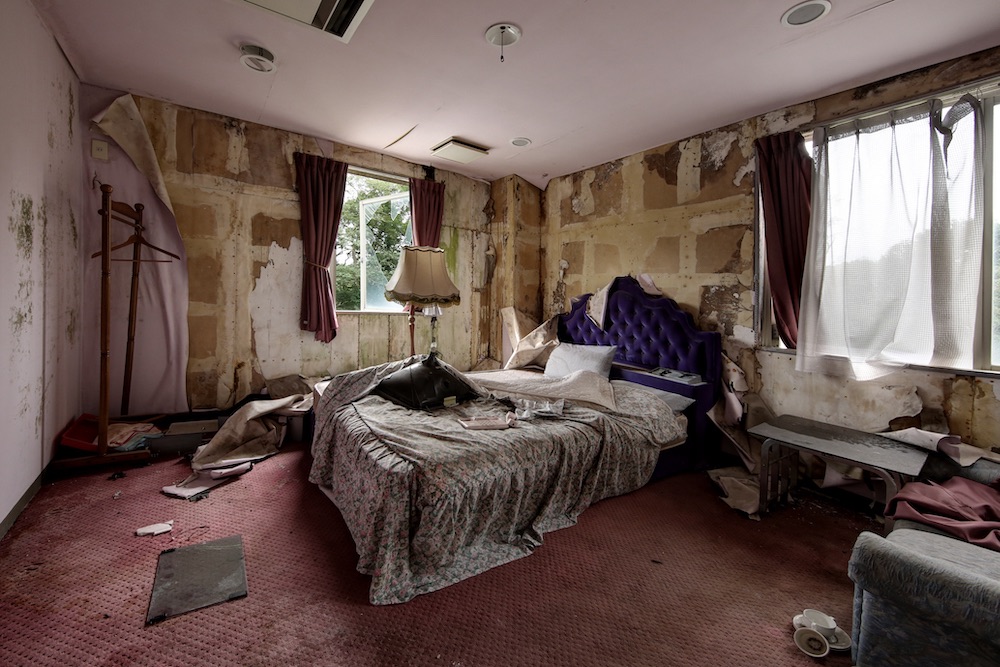Japanese culture accommodates human crudity with surprising pragmatism. Their toilets gently wash your ass, while there’s an entire range of hotels to service infidelity and one night stands. Travel to most parts of the nation and you’ll see these “love hotels” along the highways, looking cute and kitsch, with prices advertised by the hour.
Love hotels emerged as a response to a cultural tradition that demands most young couples live with extended family and enjoy little privacy for shagging. While these very short-stay venues have existed for a while, the modern term came from the official Hotel Love, which opened in Osaka in 1968. Japan’s love hotel industry flourished through the economic bubble of the early 80s, before peaking in the late 2000s, with an estimated two million people visiting hotels nationwide, every day.
Videos by VICE
But today the business isn’t what it once was. Japan’s ageing population is less interested in clandestine quickies, while its stagnant birth rate means there’s less young people who are. In 2015, roughly a quarter of young people aged 18 to 39 described themselves as sexually inactive, which is 20 percent higher than 20 years ago, leaving Japan’s tourist trade to keep the love hotels afloat.
Interestingly, this downturn has begun to blur the line between love hotels and standard hotels. Today, with the 2020 Olympics approaching, the government has begun urging businesses to dial back their raunchiness to appeal to more international visitors.
But there just aren’t enough tourists to keep love hotels buoyant, leaving many closed and abandoned. We spoke to Shane Thoms, an Australian photographer from Melbourne who has documented these abandoned places.

VICE: Hey Shane, how did you first learn about Japan’s spate of abandoned love hotels?
Shane Thoms: I have a passion for abandoned places, and because I love Japan so much, I wanted to combine my love of the country with my love for shooting abandoned places. By driving around the countryside, I’d just find all these dilapidated buildings and I’d jump in the windows and take photos. And I noticed there was a specific type of abandoned building I’d see over and over—and they were love hotels.

Do you know roughly how many of these hotels you visited?
I’ve visited so many. Probably 20 to 30? Maybe even more? I’ve got heaps of photographs of them. Some of them are very difficult to photograph because they’re dilapidated; some of them are just melting into the ground because they’re just wood and there’s not really much that I could shoot. But the ones with richer interiors and beds and things were more photographable.

Which hotels was your favourite?
The Fuu Motel, that’s one of my favourites. It’s an amazing place. I photographed that back in 2013 but it’s still there to this day. Half of it was destroyed but the other half is still there. Love hotels usually have one theme and their exterior will reflect that. But with this motel, all the rooms inside had different themes. So you had a medieval room, a traditional Japanese washitsu room, a spa room that was Grecian, and a room that was nautical because the bed was shaped like a boat. So people would choose these rooms based on, I guess, their particular fetish.

Did you have a favourite theme?
Mine would’ve been the medieval theme. I fell in love with this rich red room that was just so opulent. But it was also decayed at the same time. It was like this fading decadence. You had a bed in the shape of a horse and cart, red velvet on the walls that were ripped and covered in mould. It had a knight in shining armour that was roped off, standing by the walls, and yeah it just looked really pretty.

What other types of hotels did you see?
There was one I went to recently that was near Niigata. Most love hotels are quite comical and cute, but this one was particularly dark. There was some graffiti on the wall—it was really intense; it said something horrible. Somebody had also spray painted “red village”, which meant that it was a place of darkness. These rooms had a horrible dark energy lingering around that I didn’t like that much. I’m obsessed with horror movies, which is why I immerse myself in these places, but this place was particularly gross.
But then, just up the road, was this really fun love hotel filled with tacky 80s beds and that sort of alleviated the darkness. It was a nice contrast. Love making should be a fun thing and a lot of these interiors will reflect that.

Is it difficult to find these places?
Not really. There’s a lot of abandonment in Japan. A lot of businesses fail and people will just leave everything and move on to the next business venture. They won’t take anything with them because it’s most likely filled with a bad energy and a sense of failure. To find these places, you have to get off the main highway and into the back country roads. It has to be in the middle of nowhere, because if it’s in the city, it’ll get demolished and rebuilt. But in the country, it’s costly to demolish it and there’s no point rebuilding anything if no one ever goes there. Love hotels especially were meant to be in secret locations, so it’s when you’re driving through the mountains or on a country road that you’ll stumble across them.

Is it illegal to enter an abandoned building?
Yeah it’s trespassing; you’re not supposed to do it. But you’d never find out who owns the premise. I’m a curious person though and I like to share these stories.
What steps do you take to protect yourself from the risks that come with an abandoned building?
You just have to use common sense. These places don’t have any electricity so it’ll be dark. The floors will be slimy or slippery. Asbestos is a thing, as well as black mould. I wear a face mask because I don’t want to be breathing in the mould. I usually like to explore on my own because I like to be accountable for my own safety. If I go with other people, I’d get worried that they’d fall over and hurt themselves. Funnily enough, sometimes I take my mum with me. She’s really open-minded and modern. She finds the hotels cute and funny. The last two hotels I went to were with my mum. It’s like a cute mother and son bonding thing.

Have you ever stayed in a functioning love motel? I mean, not with your mum, but just in general?
No I’ve never stayed in one. Love hotels have a specific purpose, and even though people have sex in all hotels, when you stay in a normal one, you don’t know what the previous residents did in your room. I can’t have a cushy night in a love hotel watching Netflix in the bed, knowing that people have… you know? I’d rather not be in that space.
When I first started driving around Japan in 2010 or 2011, I was in the middle of nowhere and it was getting dark. So I pulled into the carpark of a love motel and I couldn’t find the entrance. On all the doors, there were little red lights, with a card slot for you to insert your credit card. You paid the money and the door would open. There was no reception. I didn’t know that at the time so I was knocking on all the doors trying to figure it out, and I didn’t realise that I was knocking on the doors while people were doing it. So that was the closest I’ve gotten to staying at a love hotel.

Were there any particularly raunchy items left behind in the abandoned motels?
Yeah there were. I found lots and lots and lots of condoms. Lots of sex aids. I’ve found dolls, stuff like that, which are pretty funny. They’re usually under beds or in closets but I don’t touch them or go near them.
What was the general atmosphere like?
Mostly fun and cute. Really giggly. There was just that one dark one with the graffiti on the wall, that was really gross and horrible.

You also visited an abandoned sex museum, which closed at the end of 2014. Why do you think it closed?
No idea. I guess people are not really interested in sex anymore over there. Or it’s like the love hotels and it’s affected by changing living conditions. If you’re living in a more Western type of housing instead of a traditional washitsu room, then you no longer have to step outside to experience this kind of stuff. You can do it behind closed doors. The sex museum has been demolished since I snuck in. It was in a popular onsen area so I think they bulldozed it and built something on top of it.
What have you learned from these experiences?
I guess it’s made me think about how Japan is changing. These motels were so popular in the 80s. In the mid 2000s, I would also see a lot of those spaces being active and open, but now I don’t see as many. It feels like a metaphor for the declining birth rate over there.
Interview by Nicole de Souza
Check out more of Shane’s work on his site or follow him on Instagram
More
From VICE
-

Screenshot: Team17 -

Tru-Tone -

Screenshot: Matt Vatankhah -

Screenshot: Nintendo
